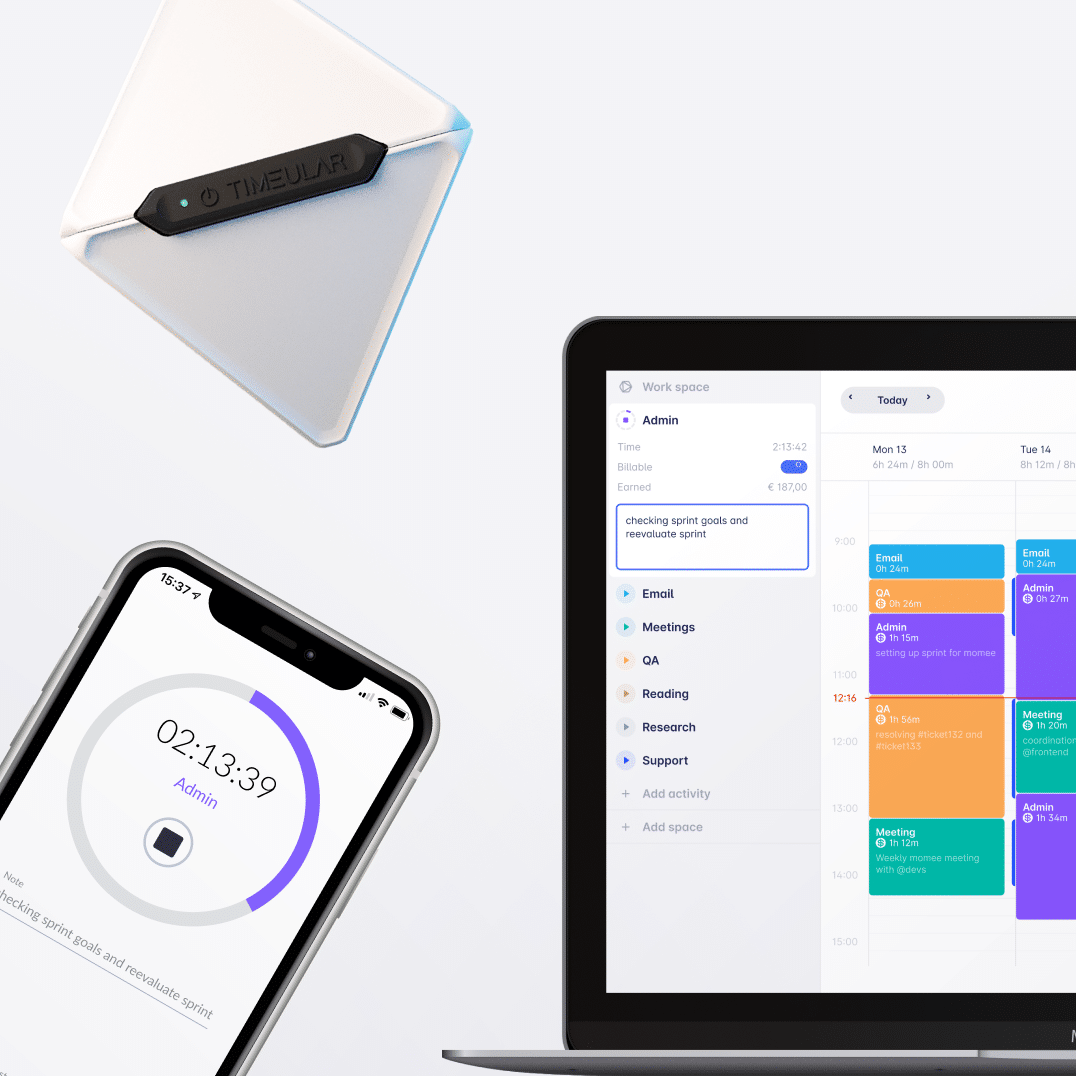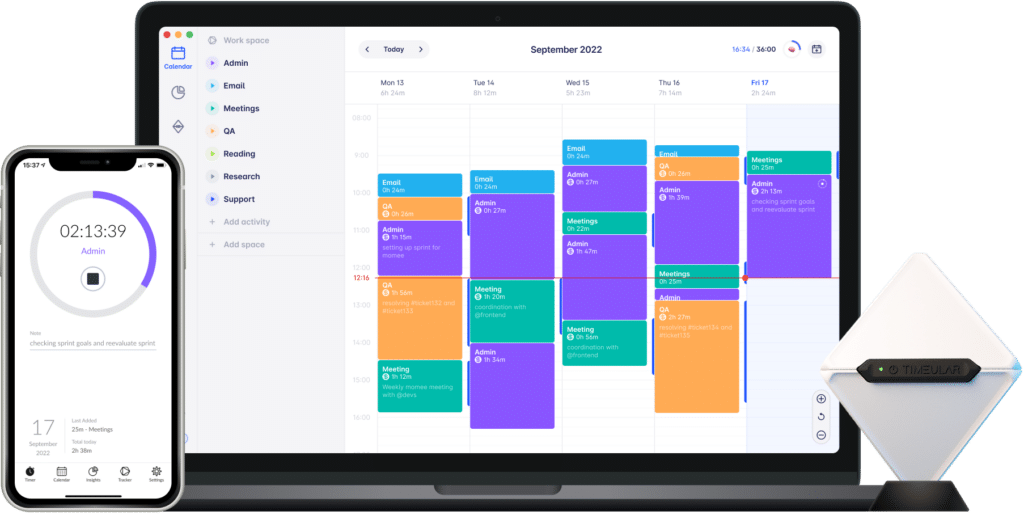What is Time Management? The Ultimate Guide
Do you ever feel that there aren’t enough hours in the day to handle everything that needs to be done at work? The good news is time management is something that can be learned! Like any other skill, you can learn to manage your time well so you don’t feel like an endless to-do list is swallowing you up.
In this article, we delve into time management in the context of work. You will find the answers to questions like “What is time management?” and “Why is it essential for a company’s success?”.
This article will provide valuable time management tips, strategies, and user-friendly tools to help you master good time management skills. Let’s get started!

Free eBook: The Complete Guide to Time Management
Get a free copy of the eBook and learn how to leverage the power of time management
Definition: What is time management?
Time management is the art of arranging and scheduling tasks to achieve your goals efficiently. It’s about knowing what to do and when, maximizing your time, resources, and strategies, and avoiding time-wasting activities.
In essence, it helps you maintain focus, minimize distractions, accomplish tasks, and maximize productivity in your work and personal life.

Looking for the most effortless and accurate time management tool?
A short time management glossary
- A time budget is a plan for wisely allocating and managing your time, much like a financial budget for money. It helps you optimize productivity and achieve daily goals.
- Time estimation is figuring out how long a project or task will take. It’s essential for project management as it helps to plan and assign resources effectively.
- The Time monkey effect is a subjective feeling that time goes faster or slower, depending if we like or dislike the task.
- Time wasters can either be individuals who steer others towards unproductive actions with no positive outcomes, or activities themselves that consume a significant amount of time without producing anything valuable.
Why is time management important?
Time management is crucial in the professional context due to its various advantages, influencing team efficiency, work-life balance, and revenue. By prioritizing tasks, maintaining focus, and maximizing efficiency, professionals can optimize their work processes, resulting in improved productivity, team happiness, and increased revenue.
- Improved focus and team productivity. It enhances overall productivity and time efficiency by enabling individuals to allocate dedicated time to daily tasks without the detrimental effects of multitasking (constant task and context switching results in wasted time). It allows for better concentration, reduces errors, and promptly completes urgent and important tasks.
- Healthy work-life balance. With time management strategies in place, professionals can manage time more efficiently, take a break, and reduce stress levels. This leads to enhanced well-being, more personal time, and higher job satisfaction.
- Revenue growth. It helps to optimize resource allocation, ensuring all team members use their time efficiently. This leads to immense cost savings! On top of that, with the right tools, you can identify non-essential tasks that use up plenty of valuable time, which could be shifted to more important tasks.
Read also:
- Time management benefits
- How to allocate resources?
- How to prevent employee work overload
- Tips for effective time management
For employees
Every one of us faces the same challenge: limited time and a never-ending list of tasks. Mastering time management is necessary if you want to succeed in your career or stay afloat during busy periods. It’s a soft skill that can make a big difference. When you manage your time effectively, you work smarter, not harder, and that can lead to career growth and personal satisfaction.
Read the article: Why time management is a soft skill
For project managers
If you’re a project manager, time management is your secret weapon. Combining it with a solid project management checklist helps you meet deadlines and allocate resources efficiently. Less stress and more success on projects can lead to promotions and bonuses. It’s a win-win.
Read also: How to teach time management
In your personal life
Effective time management isn’t just for the office. It means you’ll have more time for the things you love outside of work, whether that’s spending quality time with family or pursuing your favorite hobbies. Time is precious, and managing it well helps you prioritize what truly matters.
A few time management statistics
Here are a few examples of interesting statistics:
- Only 20% of people feel like they have their workload under control daily.
- The average corporate employee spends 51% of every workday on low to no-value tasks
- In 2018, the average commute to work (one way) took a worker 27 minutes.
To discover more stats, read the article about time management statistics.
Time management skills: Where to learn it?
If you find yourself struggling with poor time management skills, there’s no need to lose hope. You can swiftly catch up with the latest knowledge and set yourself on a path to success. Simply download our free eBook or explore the additional resources listed below.
- Best free online time management training courses
- Best time management courses
- Time management training for employees

Free eBook: The Complete Guide to Time Management
Get a free copy of the eBook and learn how to leverage the power of time management
How to start managing time in the right way
Below, we have enlisted three effective methods to curb your time management skills. Head to a separate article to learn how to improve time management skills.
1. Choose the most effortless and accurate time tracking solution
Tracking time might not top the list of most thrilling work activities, but the massive benefits make it worth it. The key? Tracking time right away. This is crucial to learn how long things take for real. Otherwise, if you end up tracking on Friday what you did on Monday, the data won’t be correct.
If you are still using manual timesheet templates, you might want to rethink it.
To track time accurately, you need an easy, effortless, and enjoyable solution.
That’s why Timeular combines the simplest time-tracking methods into one: You either just hit one shortcut on your computer, flip our 8-sided time tracking dice, or activate automatic tracking.

Looking for the most effortless and accurate time management tool?
2. Track time dedicated to each activity and project
Successful time management is all about time tracking. Tracking your time will help you understand where your time goes. It will help you answer the questions like:
- Do you have enough time to take on more tasks?
- Are there any urgent tasks that take more time than initially expected?
- Does anyone in the team need help with this one task that keeps being pushed to the next week repeatedly?
- Are there any approaching deadlines that require changing priorities?
- Does a specific task need your immediate attention?
To manage time effectively, you need to find self-discipline to track time every day and regularly review your time logs.
Remember to track time together with your team. Every person involved in the project should record their time and do it in real time. If it’s an ongoing process, after a few days of tracking, you’ll already experience the first AHA moments. After a few weeks, you’ll have a much better idea of where your time goes.
3. Run a time audit every week
Time audit is a quick review of how long your tasks take. Run time audits at least once a week to fight the Time Monkey Effect (a fake feeling that fun tasks are handled fast while tedious ones drag endlessly) and better estimate future projects.
Without time audits, you leave billable hours and scalability on the table.
Regularly checking what could be improved, automated, or eliminated in your processes helps you save time, improve efficiency, and increase revenue.
4. Promote focus and uninterrupted work
According to research, the human brain needs 23 minutes to focus on a task entirely. Promote deep work to save time and money on constant switching between activities. This will help your employees get into the productive “flow” state (a complete immersion in a task), which results in faster problem-solving, higher productivity, fulfillment, and positive feelings towards their work.
What to do to encourage deep work?
- Keep your meeting volume low,
- Introduce the policy of asynchronous work,
- And promote single-tasking (the opposite of multitasking).
Use Timeular to track time spent on low-value activities, meetings, and other disturbing tasks. Then, act accordingly – cut meetings’ time and introduce timeboxing and blocking.
Time management techniques
Time management techniques are task-dependent, and identifying the most suitable ones requires practice and repetition. It’s a skill that must be honed over time. Learn more in the dedicated article about best time management techniques.
Here are a few methods to consider:
- Time management matrix: The Eisenhower time management matrix is a strategy that categorizes specific tasks into four quadrants based on their urgency and importance, helping individuals prioritize and make decisions efficiently.
- Time blocking: Also known as time batching, time blocking is a time management strategy that involves scheduling specific blocks of time for one task at a time, helping individuals protect their focus, prevent task overload, and maintain consistent progress on larger projects.
- Timeboxing: Timeboxing is a technique where tasks have fixed deadlines in predefined time units, optimizing efficiency and concentration by working within set time limits.
- The 80/20 rule: Also known as Pareto’s principle, the 80/20 rule claims that nearly 80% of outcomes result from 20% of causes. So, when looking at your list of priorities, you should look for the tasks that can make the most impact and work on those first.
- 4d of time management: The 4 Ds of Time Management are used to categorize and prioritize tasks into four categories: Delete, Delegate, Defer, and Do. It helps boost productivity and efficiency by focusing on important tasks, avoiding overwhelm, and ensuring effective task management.
- Task batching: A productivity strategy where similar tasks are grouped and tackled together during specific time blocks. The aim is to minimize interruptions, increase focus, and enhance efficiency by concentrating on a set of related activities without constant switching and interruptions.
- The Pomodoro technique: helps you manage your time by enhancing focus and concentration. It involves working in concentrated bursts of 25 minutes, known as ‘Pomodoros,’ followed by a brief 5-minute break. To implement the technique, use our free Pomodoro timer.
- Time mapping: Time mapping involves breaking the day into specific time blocks. This method allocates dedicated periods for personal and work responsibilities, facilitating efficient planning and tracking of time spent on various activities.
Resources:
Best time management tools
The best way to improve your time management skills is to understand how you currently use your time and identify areas where you could be more productive.
If you’re not sure how much time you’re spending on different tasks each day, several tools will help you discover that:
- A time tracking app. It’s a digital solution that helps to track time automatically, without manual effort. When looking for a time tracking tool, ensure it’s simple, user-friendly, and accurate. One example of such software is Timeular.
- Spreadsheets. They are a low-cost alternative to time tracking apps. Although it’s a flexible tool, time tracking with spreadsheets will be time-consuming and slow.
- Planners provide another way of tracking time and tasks manually. If you want to learn more about planners, take a look at the resources below:
How to create a time management plan
When discussing time management, it’s crucial to remember that it goes beyond just time. Implementing time-saving tips won’t suffice if you can’t manage your energy, focus, and priorities, whether at work or home.
Therefore, it’s important to create a comprehensive time management plan, which should include:
- Setting realistic goals
- Prioritizing tasks
- Enhancing collaboration with others
- Efficiently utilizing your time
- Avoiding procrastination
With this plan in place, you’ll have a clear understanding of your tasks and their time requirements. Staying committed to your plan will ensure you can effortlessly meet all your deadlines and achieve your goals.
- Read the article about how to create a time management plan.
A final note
In conclusion, time management is not just a concept but a powerful skill that can help you increase productivity, stay focused, handle the most challenging tasks fast, and transform the way you approach your work and personal life. It’s the key to reclaiming control over your time and preventing that feeling of being overwhelmed by an endless to-do list.
This comprehensive guide has explored the fundamental principles of effective time management, emphasizing that it’s not only about scheduling tasks but also about optimizing your energy, focus, and priorities. By now, you have a clear understanding of what time management is, why it’s crucial for individual and organizational success, and how it can lead to improved productivity, work-life balance, and even revenue growth.
To excel in time management, choose effective tracking tools, monitor time allocation, and regularly evaluate your tasks. Embrace techniques like time boxing and the 80/20 rule. Remember, it is a journey of continuous improvement, enabling you to achieve your goals efficiently and enjoy a more balanced and fulfilling life. So, start today, and watch your productivity soar.
FAQ
Yes. It is often linked to productivity because of the higher level of achievement that comes from using your time wisely. Time management helps you be more productive and get more done in less time, which means you’re getting more out of each day.
Yes. It is a great way to reduce stress because it makes you focus on what is important. This means you won’t spend your time multitasking or doing things that aren’t a priority or helpful, which means less stress and more peace of mind. Read our blog to know the top causes of stress at work and how to avoid them.
Yes. It can be classified as a soft skill because it’s more than just knowing what to do; it’s about understanding how to do something efficiently and effectively.
You might be interested in:





